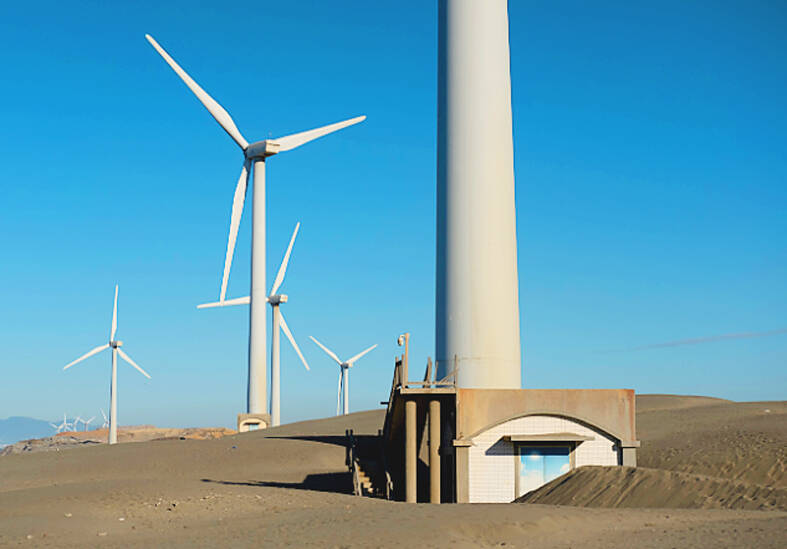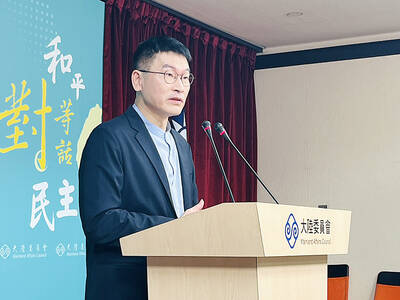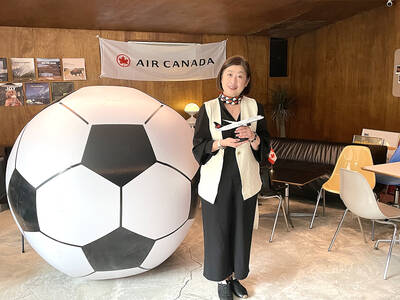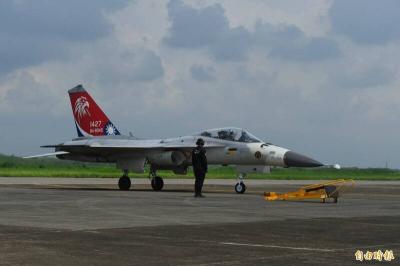A Ministry of Environment agency pushed back after an international climate ranking rated Taiwan as a “very low” performer on climate change, saying that a decline in carbon emissions for a third straight year shows its policies are working.
The Climate Change Performance Index released online on Tuesday ranked Taiwan 59th out of 67, up from 60th last year and 61st two years ago.
For the four main categories considered in each economy’s final score, Taiwan received a “very low” rating for greenhouse gas emissions and energy use, and a “low” rating for renewable energy and climate policy.

Photo: CNA
The categories consider indicators that highlight existing conditions and trends. Taiwan generally did better in the “trend” indicators than those describing the current situation.
The Climate Change Administration disputed the findings on the same grounds it has previously, saying that the methodology of the index is “controversial.”
Japan (ranked 57th) and Canada (ranked 61st) also questioned the rankings at a Climate Change Performance Index news conference this year.
The index relies on per capita emissions for its rankings, which is unreasonable, the Climate Change Administration said, adding that the UN’s Emissions Gap Report showed that climate effort evaluations should also take into account total emissions and overall trends, not per-capita data alone.
The index showed Taiwan’s per-capita emissions as 10.92 tonnes of carbon equivalent (tCO2e) per person, lower than 12.85 for South Korea, 16.69 for Canada and 15.23 for the US, but higher than 3.84 for Thailand and 4.07 for Malaysia.
Taiwan is actually lowering carbon emissions, the agency said, citing the Global Carbon Budget released earlier this month, which estimated that Taiwan’s carbon emissions fell 2.1 percent this year from last year.
That placed it among one of 35 countries “reducing emissions while growing their economies,” it said.
Moreover, the Emissions Database for Global Atmospheric Research, run by the European Commission’s Joint Research Centre, found that Taiwan’s emissions were down 9.6 percent last year compared with 2005, while global emissions increased by about 30 percent, the agency said.
Taiwan and Japan were the only two major Asian countries with decreasing trends in carbon emissions, the agency said, citing the research center’s data.
Germanwatch, one of the publishers of the Climate Change Performance Index, previously told the Central News Agency that it preferred the per capita emissions metric because it better reflects the need for a quick reduction of total global emissions to limit the increase in global temperatures to 1.5°C above pre-industrial levels, as set in the 2015 Paris Agreement.
In the report detailing the index, the experts covering Taiwan criticized its continued expansion of liquefied natural gas (LNG) in place of coal, which locks in emissions.
At the same time, there is a lack of laws and clear strategy for phasing out coal and reducing other fossil fuels, and while there is a range of renewable plans, implementation has been slow and inconsistent, they said.
Having phased out the last nuclear power reactor in Taiwan in the middle of the year, Taiwan derived 85.5 percent of its electricity from fossil fuels in the first nine months of the year, up from 83 percent during the same period last year, the index showed.
Within the fossil fuel category, 47.1 percent of all power generated was from LNG, up from 41.5 percent a year earlier, while 36.8 percent was from coal, down from 40.1 percent year-over-year, it showed.
Renewable energy, consisting of hydro, geothermal, solar, wind, biomass and waste, provided 12 percent of Taiwan’s power needs in the first nine months, up from 10.8 percent in the same period a year earlier, Energy Administration data showed.
In 2016, when plans to phase out nuclear power were introduced, the government had projected that 20 percent of Taiwan’s electricity would be generated from renewable sources by this year.
East Asian economies generally fared poorly in the index, with China ranked 54th, Japan 57th and South Korea 63rd.
The US was 65th, down eight spots from a year earlier, and major oil producers the United Arab Emirates, Russia, Iran and Saudi Arabia ranked in the bottom six places.
The index is based on four categories: greenhouse gas emissions (accounting for 40 percent of the overall score), renewable energy (20 percent), energy use (20 percent) and climate policy (20 percent).
The index monitors countries’ climate mitigation performances with the aid of 450 national experts evaluating their national and international climate policies.

LOW RISK: Most nations do not extradite people accused of political crimes, and the UN says extradition can only happen if the act is a crime in both countries, an official said China yesterday issued wanted notices for two Taiwanese influencers, accusing them of committing “separatist acts” by criticizing Beijing, amid broadening concerns over China’s state-directed transnational repression. The Quanzhou Public Security Bureau in a notice posted online said police are offering a reward of up to 25,000 yuan (US$3,523) for information that could contribute to the investigation or apprehension of pro-Taiwanese independence YouTuber Wen Tzu-yu (溫子渝),who is known as Pa Chiung (八炯) online, and rapper Chen Po-yuan (陳柏源). Wen and Chen are suspected of spreading content that supported secession from China, slandered Chinese policies that benefit Taiwanese and discrimination against Chinese spouses of

ALIGNED THINKING: Taiwan and Japan have a mutual interest in trade, culture and engineering, and can work together for stability, Cho Jung-tai said Taiwan and Japan are two like-minded countries willing to work together to form a “safety barrier” in the Indo-Pacific region, Premier Cho Jung-tai (卓榮泰) yesterday said at the opening ceremony of the 35th Taiwan-Japan Modern Engineering and Technology Symposium in Taipei. Taiwan and Japan are close geographically and closer emotionally, he added. Citing the overflowing of a barrier lake in the Mataian River (馬太鞍溪) in September, Cho said the submersible water level sensors given by Japan during the disaster helped Taiwan monitor the lake’s water levels more accurately. Japan also provided a lot of vaccines early in the outbreak of the COVID-19 pandemic,

PROMOTION: Travelers who want a free stopover must book their flights with designated travel agents, such as Lion Travel, Holiday Tours, Cola Tour and Life Tours Air Canada yesterday said it is offering Taiwanese travelers who are headed to North America free stopovers if they transit though airports in Japan and South Korea. The promotion was launched in response to a potential rise in demand for flights to North America in June and July next year, when the US, Canada and Mexico are scheduled to jointly host the FIFA World Cup, Air Canada said. Air Canada offers services to 13 of the 16 host cities of the tournament’s soccer games, including Toronto and Vancouver; Mexico City, Guadalajara and Monterrey in Mexico; Atlanta, Georgia; Boston; Dallas; Houston;

The US approved the possible sale to Taiwan of fighter jet spare and repair parts for US$330 million, the Pentagon said late yesterday, marking the first such potential transaction since US President Donald Trump took office in January. "The proposed sale will improve the recipient's capability to meet current and future threats by maintaining the operational readiness of the recipient's fleet of F-16, C-130," and other aircraft, the Pentagon said in a statement. Trump previously said that Chinese President Xi Jinping (習近平) has told him he would not invade Taiwan while the Republican leader is in office. The announcement of the possible arms